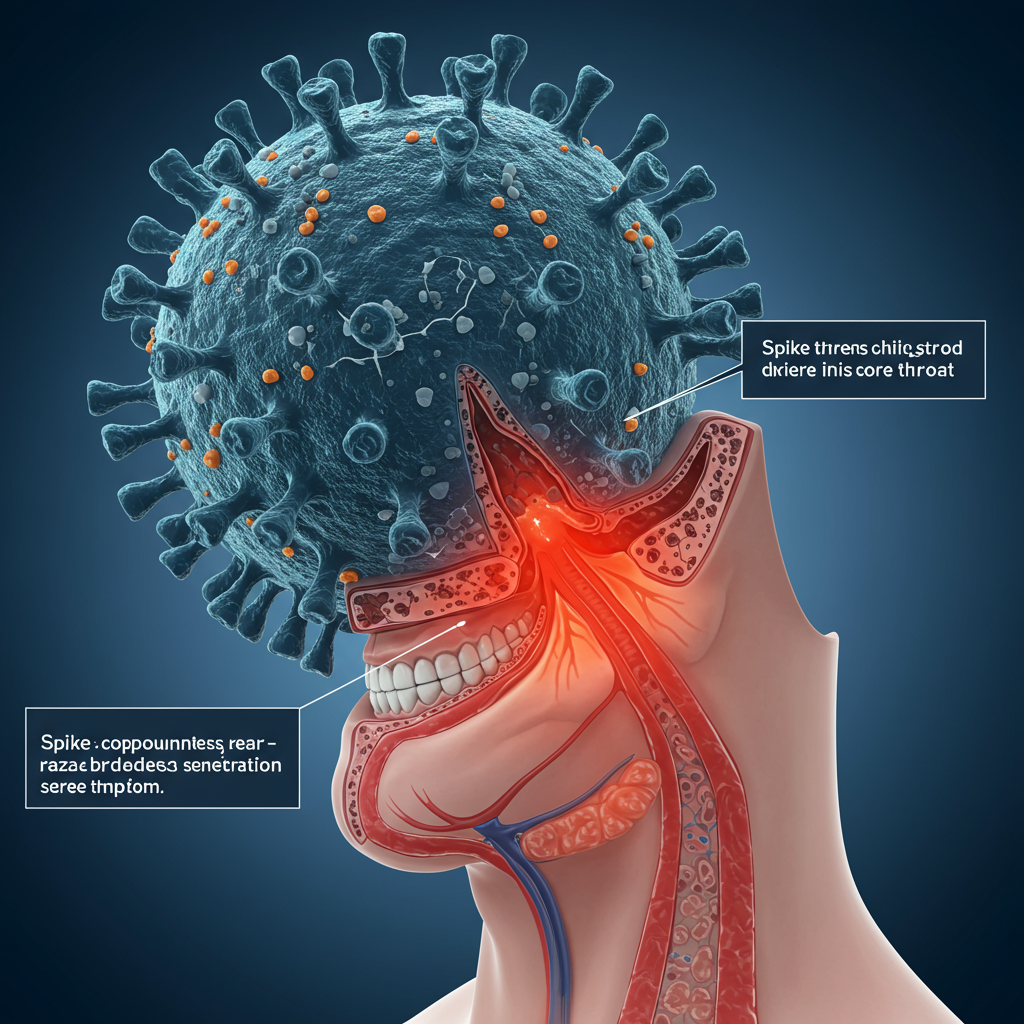A new mutation of the virus that causes COVID-19 is gaining attention, partly due to a particularly intense symptom: a sore throat so severe it’s been described as feeling like “razor blades.” This variant, designated NB.1.8.1 and informally dubbed “Nimbus,” is currently under monitoring by global health authorities.
The “Razor Blade” Sore Throat Symptom
Reports highlight an increase in individuals experiencing excruciating throat pain with recent COVID-19 infections, leading to the vivid “razor blade” or “shards of glass” descriptions. This severe symptom can make speaking, eating, and even staying hydrated incredibly difficult.
However, while alarming and intensely painful for those affected, health experts note that severely painful sore throats have been a reported symptom of COVID-19 since the early days of the pandemic and are not necessarily unique to this specific new variant. The intensity of a sore throat doesn’t automatically indicate a new or more dangerous form of the virus, though recent attention has led to increased searches for this symptom.
Other Symptoms of the Nimbus Variant (NB.1.8.1)
Beyond the notable sore throat, infections with the NB.1.8.1 variant present with symptoms commonly associated with previous Omicron subvariants. These include:
Congestion
Fatigue
Mild cough
Fever
Muscle aches
Headaches
Gastrointestinal issues such as diarrhea and nausea (less frequent)
Symptom presentation can vary widely depending on the individual and their vaccination history.
Understanding the Nimbus Variant
NB.1.8.1 is a descendant of the Omicron lineage, classified by the World Health Organization (WHO) as a Variant Under Monitoring (VUM). It was first identified in January 2025 and has since spread globally. Early reports indicated a surge in cases in Asia, with the variant now detected in countries across the United States, Europe, and Canada, making up over 10% of cases in some regions.
The variant is believed to be more contagious than earlier mutations. Genetic analysis suggests it has undergone recombination events and possesses mutations that may enhance its ability to evade immunity from prior infections. This heightened transmissibility is attributed to the variant’s potentially tighter binding to human cells. While experts are monitoring its spread and potential for causing a summer surge, health officials currently suggest there is no strong evidence that NB.1.8.1 causes more severe illness overall compared to other circulating Omicron strains. The WHO currently assesses the global risk posed by this variant as low.
Protection and Prevention
Existing COVID-19 vaccines are still considered effective in preventing severe disease, hospitalization, and death from the NB.1.8.1 variant. Staying up-to-date with recommended vaccinations remains a crucial preventive measure, particularly for individuals at higher risk of severe illness, such as older adults, those with underlying health conditions, and pregnant individuals, as COVID infection during pregnancy can lead to significant complications.
In addition to vaccination, practicing good hygiene and public health measures can help mitigate spread:
Regularly wash hands with soap and water.
Cover your mouth and nose when coughing or sneezing.
Consider wearing masks, especially in crowded or poorly ventilated indoor spaces.
Maintain physical distance from individuals who are sick.
Improve ventilation in indoor spaces.
Test if you develop symptoms to confirm if it is COVID-19, as respiratory symptoms could also be from other viruses like the flu or common cold.
Isolate if you test positive to avoid spreading the virus.
Managing Symptoms and Seeking Care
For those experiencing the painful sore throat or other symptoms:
Use over-the-counter pain relievers like acetaminophen or ibuprofen.
Gargle with warm saltwater.
Suck on throat lozenges or use throat sprays for temporary relief.
Stay well-hydrated by drinking warm liquids like herbal teas or broths.
- Consider using a humidifier to keep the air moist.
- timesofindia.indiatimes.com
- www.hindustantimes.com
- m.economictimes.com
- katiecouric.com
- www.iflscience.com
It is important to monitor your symptoms. Seek medical attention if your throat pain or other symptoms do not improve, worsen over time, or if you experience difficulty breathing, a high fever that persists, or signs of dehydration (like inability to drink fluids due to pain). Consulting a healthcare provider is especially important for individuals with underlying health conditions, the elderly, and pregnant people.
While many people want to move past the pandemic, health experts emphasize that the virus continues to circulate and evolve. Remaining informed about new variants and maintaining preventative measures is key to personal and community health. The potential for repeat infections also highlights concerns around long-term impacts like Long COVID. Experts continue to monitor the situation closely.




